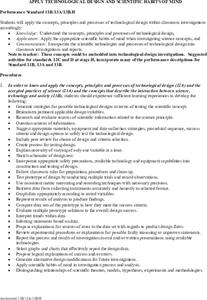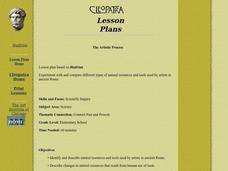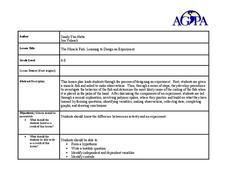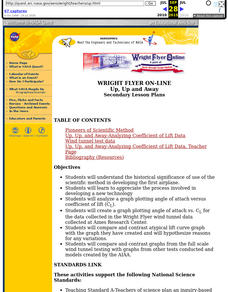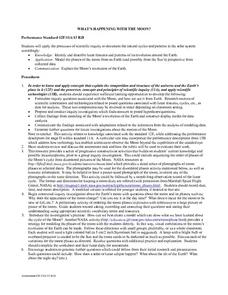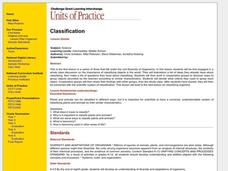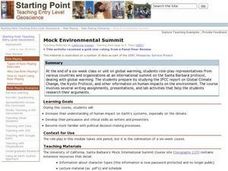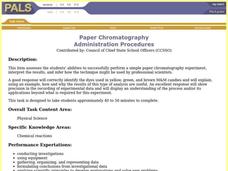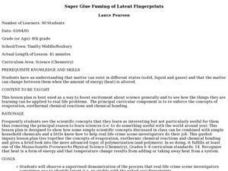Curated OER
Mystery Boxes: Uncertainty and Collaboration
Students manipulate boxes with unknown internal structure and contents to become familiar with the concept of uncertainty in science.
Curated OER
Microbes in Long Island Sound
Students discover the harm and benefits of microbes. In this biology lesson, students explore water, nitrogen and carbon cycles. They investigate the factors affecting bacteria growth.
Curated OER
Biological Relationships - Coral Reef Memory Game and Chain Game
Students familiarize themselves with the interconnectedness of species within an ecosystem, and to use this knowledge to evaluate how the removal or decimation of one species can have far reaching effects.
Curated OER
Life Means Water Environment
Students investigate pH levels in bodies of water and experiment with acid/base reactions. In this water and pH lesson, students observe changes in pH levels of a sample solution and observe a Bronsted-Lowry reaction. Students...
Curated OER
The Great Fossil Find - Reconstructing the Pieces
Students go on an imaginary fossil hunt. They follow a script read by the teacher, students "find" (remove from envelope) paper "fossils" of some unknown creature. They attempt to reconstruct fossil pieces into an animal.
Curated OER
Earth's Energy Cycle: Albedo
Learners complete all of the steps in the scientific inquiry process to study Earth's energy cycle; most specifically temperature and the effects of albedo (energy reflected back from Earth's surface) on temperature.
Curated OER
Where Does Maple Syrup Come From?
In this maple syrup worksheet, students read an informational article about the discovery of maple syrup, how we get maple syrup today, the "sugar house", how to grade it, and a recipe for a snow cone. Students answer nine true and false...
Curated OER
Coal Flowers
Let's make coal flowers! With this fun activity, young learners watch and learn as they grow crystals! With simple household materials and the instructions included in this lesson plan, your class can grow their own crystals. Learners...
Kenan Fellows
Sustainability: Learning for a Lifetime – Soil
Do great gardeners really have green thumbs—or just really great soil? Environmental scholars discover what makes Earth's soil and soil quality so important through research and experimentation. Learners also develop an understanding of...
Curated OER
Apply Technological Design and Scientific Habits of Mind
Students are introduced to the concepts involved in technological designs. In groups, they design and build a technology related item using research to backup why they have chosen that specific design. They experiment by varying...
Curated OER
Scientific Inquiry: Periodic Motion
Learners construct their own pendulum. In this physics lesson plan, students design an experiment to find the factors affecting its period. They formulate a conclusion based on experimental data.
Curated OER
The Artistic Process
Students experiment with and compare different types of natural resources and tools used by artists in ancient Rome. They describe changes in natural resources that result from human use of tools.
Curated OER
Scientific Who's Who
Eighth graders research a scientist from a specific culture or time period.
Curated OER
What is the Thermal Depolymerization Process?
Young scholars examine the differences between Boyle's Law and Charles' Law. They discuss the concept of thermal depolymerization. They answer discussion questions to end the instructional activity.
Curated OER
The Miracle Fish: Learning to Design an Experiment
Students develop procedures to explore the behavior of fish. In this scientific experiment lesson students from a hypothesis, write a question, identify different variables and controls in their experiment.
Curated OER
Untitled Document Aerospace Team Online:
Students explain the historical significance of use of the scientific method in developing the first airplane and appreciate the process involved in developing a new technology.
Curated OER
What's Happening With the Moon?
Young scholars review the process of scientific inquiry. Using this information, they identify the patterns and cycles of the moon as it revolves around the Earth. In groups, they model the phases of the moon from the Earth and Sun's...
Curated OER
Classification
Students investigate how to classify items based on similar characteristics. They study the scientific system of classification.
Curated OER
Mock Environmental Summit
Students increase understanding of human impact on Earth's sytems and the climate. They develop persuasive and critical skills as writers and presenters. They become familiar with political decision making processes.
Curated OER
Can You Detect Bias?
Eleventh graders recognize some, but not all ethical processes (e.g., independent verification, clarifying assumptions, disclosing conflicts of interest) that shape scientific endeavors. Students build awareness of how various sources...
Curated OER
Paper Chromatography
Small groups of students perform paper chromatography to separate food dyes into their component colors. Students perform the experiment and collect, organize, and represent their data to form an explanation of their outcomes. Students...
Curated OER
Physicists or Philosophers?
Trace the sequential process of the developing theories of atomic structure in the early 20th century, show, in historical development, how scientists "know" things, how experiments are set up and how interpretations are drawn from them,...
Curated OER
Determining the Geologic History of Rocks from a Gravel Deposit
Students apply the scientific method to identify rocks from glacial deposits, hypothesize how they got there and then test their hypothesis. They are given the experience of active, hands-on inquiry.
Curated OER
Super Glue Fuming of Latent Fingerprints
Students explore latent fingerprinting. They observe a supervised demonstration of the process that real-life crime scene investigators sometimes use to identify latent fingerprints. In addition, they brainstorm ways to improve the...
Other popular searches
- Scientific Process Skills
- The Scientific Process
- Scientific Process Observe
- Scientific Process Food
- Scientific Process Bridges
- Scientific Process Measure
- Scientific Process Lab
- Scientific Process Vitamin C
- Science Scientific Process











